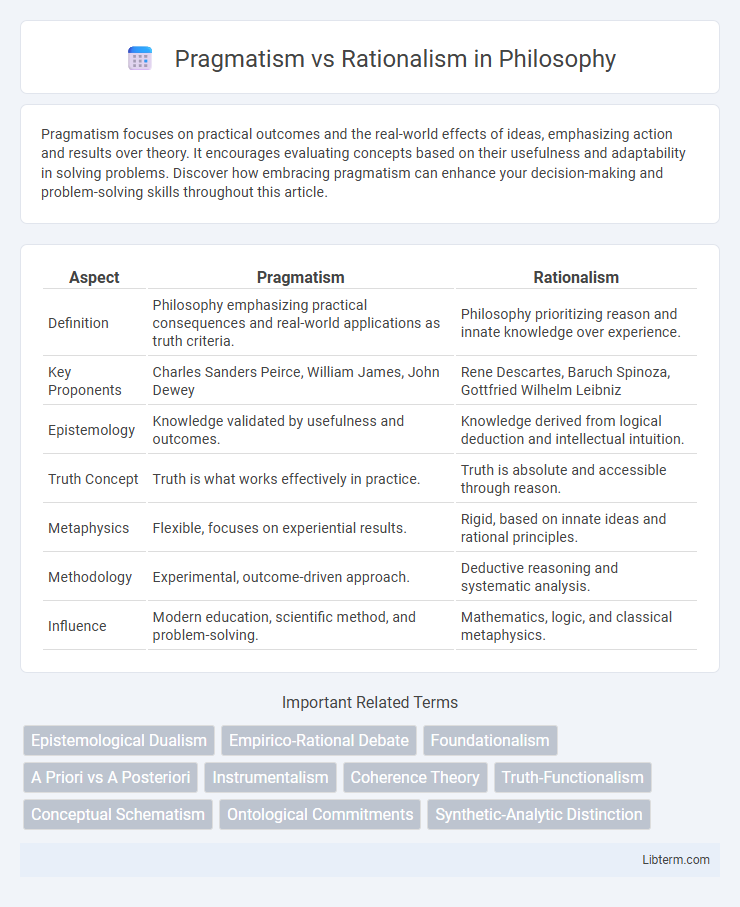Pragmatism focuses on practical outcomes and the real-world effects of ideas, emphasizing action and results over theory. It encourages evaluating concepts based on their usefulness and adaptability in solving problems. Discover how embracing pragmatism can enhance your decision-making and problem-solving skills throughout this article.
Table of Comparison
| Aspect | Pragmatism | Rationalism |
|---|---|---|
| Definition | Philosophy emphasizing practical consequences and real-world applications as truth criteria. | Philosophy prioritizing reason and innate knowledge over experience. |
| Key Proponents | Charles Sanders Peirce, William James, John Dewey | Rene Descartes, Baruch Spinoza, Gottfried Wilhelm Leibniz |
| Epistemology | Knowledge validated by usefulness and outcomes. | Knowledge derived from logical deduction and intellectual intuition. |
| Truth Concept | Truth is what works effectively in practice. | Truth is absolute and accessible through reason. |
| Metaphysics | Flexible, focuses on experiential results. | Rigid, based on innate ideas and rational principles. |
| Methodology | Experimental, outcome-driven approach. | Deductive reasoning and systematic analysis. |
| Influence | Modern education, scientific method, and problem-solving. | Mathematics, logic, and classical metaphysics. |
Introduction to Pragmatism and Rationalism
Pragmatism emphasizes practical consequences and real-world applications as the core criteria for truth, championed by thinkers like Charles Sanders Peirce and William James. Rationalism asserts that reason and innate ideas are the primary sources of knowledge, with key proponents including Rene Descartes and Baruch Spinoza. These philosophical approaches contrast in their reliance on empirical experience versus logical deduction to understand reality.
Historical Background of Both Philosophies
Pragmatism emerged in the late 19th century United States, pioneered by philosophers like Charles Sanders Peirce, William James, and John Dewey, emphasizing practical consequences and experiential verification in truth assessment. Rationalism traces back to ancient Greece, with key figures such as Rene Descartes, Baruch Spinoza, and Gottfried Wilhelm Leibniz, advocating that reason and innate knowledge are primary sources of understanding reality. Both philosophies developed as responses to epistemological challenges, shaping modern debates on knowledge, belief, and scientific inquiry.
Core Principles of Pragmatism
Pragmatism centers on the belief that truth is determined by practical consequences and real-world applications, emphasizing experience and action as guides for knowledge. Core principles include the emphasis on problem-solving through experimentation, the rejection of absolute truths in favor of evolving understanding, and the idea that meaning is rooted in observable outcomes. This approach contrasts with Rationalism, which prioritizes reason and innate ideas as the primary sources of knowledge.
Core Tenets of Rationalism
Rationalism centers on the belief that reason and innate knowledge are primary sources of understanding, emphasizing logic and deduction over sensory experience. It asserts that certain truths, such as mathematical principles and fundamental concepts, exist independently of empirical evidence. This core tenet distinguishes rationalism from pragmatism, which prioritizes practical outcomes and experiential learning over abstract reasoning.
Key Differences Between Pragmatism and Rationalism
Pragmatism emphasizes practical consequences and real-world applications as the basis for truth, valuing experience and experimentation over abstract reasoning. Rationalism, by contrast, asserts that knowledge is primarily acquired through reason and innate ideas, prioritizing logical deduction and intellectual intuition. The key difference lies in pragmatism's focus on outcomes and adaptability versus rationalism's reliance on a priori principles and inherent knowledge.
Influential Thinkers and Proponents
Pragmatism, championed by Charles Sanders Peirce, William James, and John Dewey, emphasizes practical consequences and experiential learning as the basis for truth and knowledge. Rationalism, advocated by Rene Descartes, Baruch Spinoza, and Gottfried Wilhelm Leibniz, asserts that reason and innate ideas are the primary sources of knowledge, independent of sensory experience. These influential thinkers shaped distinct epistemological frameworks, with pragmatists focusing on utility and outcomes, while rationalists prioritize logical deduction and a priori principles.
Applications in Science and Everyday Life
Pragmatism in science emphasizes practical outcomes and empirical testing, guiding experimental design and adaptive problem-solving, while rationalism relies on logical reasoning and theoretical frameworks to derive knowledge independently of sensory experience. In everyday life, pragmatism fosters decision-making based on real-world effectiveness and consequences, whereas rationalism promotes choices grounded in coherent principles and deductive logic. Both approaches influence innovation and critical thinking, with pragmatism enhancing empirical adaptability and rationalism ensuring consistency and systematic understanding.
Criticisms of Pragmatism and Rationalism
Criticisms of pragmatism highlight its perceived relativism and lack of fixed principles, which some argue undermine objective truth and lead to excessive focus on practical outcomes at the expense of deeper philosophical inquiry. Rationalism faces critiques for overemphasizing reason and innate ideas, potentially neglecting empirical evidence and sensory experience essential for comprehensive knowledge. Both philosophies encounter challenges regarding the balance between theoretical rigor and practical applicability in epistemology.
Pragmatism and Rationalism in Modern Thought
Pragmatism emphasizes practical consequences and experiential verification as the core of truth, influencing fields like education, law, and ethics in modern thought. Rationalism prioritizes reason and innate ideas, driving advancements in mathematics, logic, and scientific methodology. Both paradigms shape contemporary philosophy by balancing empirical evidence with logical analysis for knowledge acquisition.
Conclusion: Bridging the Philosophical Divide
Pragmatism and Rationalism converge through their shared commitment to truth, underscoring the practical application of ideas alongside rigorous logical reasoning. Integrating empirical evidence with critical analysis fosters a holistic approach that values both experiential outcomes and intellectual coherence. This synthesis enhances decision-making processes by balancing adaptability with systematic inquiry, bridging the philosophical divide effectively.
Pragmatism Infographic

 libterm.com
libterm.com